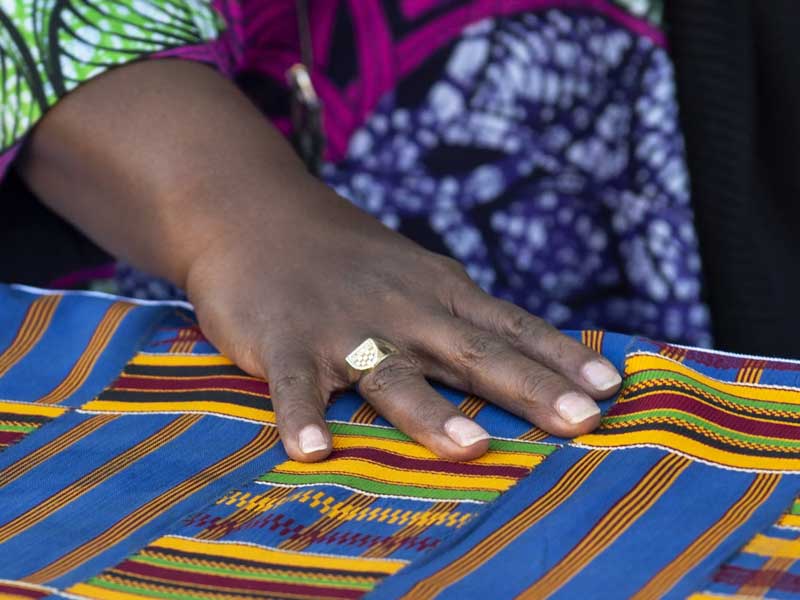As part of Virginia Commonwealth University’s ongoing effort to reconcile its past with its present, professors and students have introduced a curriculum program for high-schoolers centered on the ethical treatment of human remains.
The curriculum is tied to the East Marshall Street Well Project, which was established in 2013 to facilitate the appropriate study, memorialization and reburial of remains discovered in an abandoned 19th-century well on the university’s MCV Campus. Tal Simmons, Ph.D., a professor in the Department of Forensic Science in the College of Humanities and Sciences, led the curriculum initiative with a $15,000 Global Initiatives grant from the Wenner-Gren Foundation, which supports anthropology work worldwide..
Simmons developed the lessons with Elizabeth Edmondson, Ph.D., a research professor in the Department of Teaching and Learning in VCU’s School of Education, along with Richmond Public Schools teachers Emily Betts and Matt Wester as well as VCU student Tori Solano, who is pursuing a master’s degree in teaching.
“What we wanted to do was open the eyes of high school students to careers in science, and to issues within their own community that they might not have been aware of,” Simmons said of the curriculum. “[We wanted to] generally encourage them to go into science and become active in their communities with issues like this.”
In 1994, the remains of at least 44 adults and nine children were discovered in the well during construction on campus. Historical and scientific research determined that the remains were primarily of Black Richmonders whose bodies had been stolen between 1848 and 1860, used for anatomical study at the Medical College of Virginia and then discarded in the well.
The East Marshall Street Well Project has been working to address critical issues and concerns regarding the remains of the human beings discovered in the well – with a focus on emphasizing dignity and respect – and to implement the recommendations of the Family Representative Council, which represents the descendant community.
The curriculum, which is available through #GoOpenVA, offers an overview of the development of medical ethics and ethics in different disciplines, and it then moves into anthropological methods for human identification and how DNA is used to identify people. It includes roughly a week’s worth of lecture and lab activities. This past November, the curriculum was presented at the Virginia Association of Science Teachers conference.
In 2023 and 2024, Simmons and several VCU forensic science students gave five presentations of the pilot curriculum at Open High School and Franklin Military Academy, which are part of Richmond Public Schools, as well as Carver College and Career Academy in Chesterfield County.
Wester, a science teacher at Franklin Military Academy, said the curriculum allowed his students to learn at a college level.
“It gave us the opportunity to learn about some interesting things, both in terms of biotechnology and our community, and also work on skills like taking notes from a lecture, some reading skills and more,” he said, adding that the VCU students learned how to better connect with high-schoolers. “It was just a great opportunity all around.”
Wester’s students, in grades 9-12, did three iterations of the curriculum pilot. Feedback from one student, which was included in Simmons’ grant report, stated that the educators “did an amazing job explaining everything honestly, and learning about the different ways they go about delicately conducting research and linking people to their ancestors is truly amazing to me.”
The curriculum is just one aspect of the East Marshall Street Well Project’s ongoing work. In January 2022, the remains of the people discovered in the well were transferred from the Virginia Department of Historic Resources to the VCU Department of Forensic Science, where researchers began seeking to understand more about who the people were and the cultural and historical context in which they lived.
The aim is to answer questions developed by the Family Representative Council related to biochemical and DNA analysis of the remains, including information about the regional genetic ancestry of the individuals; the sex of children and younger adolescents whose sex cannot be determined by physical examination of the bones; the health environments of the individuals; and any connections between individuals whose remains were discovered and potential living descendants.
Simmons projected that the lab work will be completed by the end of this summer or early fall.
For more about the East Marshall Street Well Project, including the recommendations of the descendant community, please visit the project homepage.
